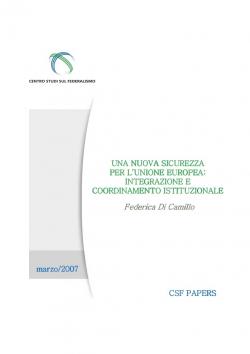Una nuova sicurezza per l'Unione europea: integrazione e coordinamento istituzionale
The research shows some European dynamics related to a new concept of security. The core of this redefinition lies in the functional security which, setting the human factor at its centre, is aimed at assuring the effective and efficient continuity of the vital functions of societies against events that could cause their disruptions.
As to the risks related to this new security, intentional, natural and accidental events are put on the same level, in the light of types of protection and management which can be largely the same in case of both a casual or caused emergency.
The evolution of the areas covered by the US Homeland Security system, and of the European initiatives following the September 11, concretely illustrates this idea of transversal security interests ranging from international terrorism to natural disasters and man-made incidents, as synthesised for the EU by the disposals of the solidarity clause.
Given that functions are what is to be safeguarded, a particular attention is devoted to the infrastructures that convey them, considered in their physical (transport, energy and water supply networks), economic (banking and financial system) or virtual sense (cyberspace and telecommunications).
Moreover, since distances today are not only determined by geographic data, but also by the potential rapidity of connections, a response to vulnerability of the systems and their interconnections is rather urgent.
The variety of these threats - for which geographical, economic, bureaucratic, political, in one word functional borders do not matter – leads to a proliferation of authorities involved in Europe in the management of security. The traditional competencies are thus brought into question, with new interactions and overlaps. The latter must be first of all recognised as such, and then organised and managed.
In this regard, throughout this paper, it is observed that the political-institutional coordination is the key point to which practices and reforms should aim to.
The Union currently represents a privileged framework for the realisation of these dynamics, as shown by some proposal of the current debate, which contribute to the identification of institutional solutions for greater coordination and integration.
Moreover, all kinds of initiative in this sense must involve the private sector - especially by setting up appropriate public-private partnerships – as well as the research in the security sector, which has a still unexplored potential.
Finally, changes in doctrines and trainings should support new guidelines and approaches in the security management. These proposals, some realised, some partial, some to be finalised, are not the final answer, not even those, more innovative, related to the establishment of supra-authorities at the EU level.
The issue is not providing a final and optimal answer to the security management, if we consider that this is a subject - de iure et de facto – in continuous evolution, just like the threats which characterise it. The realistic aim is to provide security with a more aware, higher, structured and lasting political treatment.
-
Details
in CSF Papers, March 2007, 79 p.
Introduzione
1. Una realizzazione: la Homeland Security statunitense
2. La situazione in Europa
3. Verso una nuova definizione di sicurezza
4. Europa ed autorità di sicurezza
5. Funzioni di sicurezza in Europa: alcune interazioni e sovrapposizioni
6. Coordinamento ed integrazione: evoluzioni delle problematiche e dibattito sulle linee di risposta
Considerazioni



